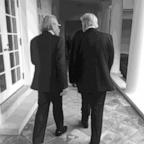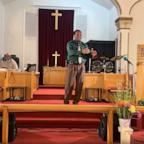Hackers Claim They Hacked Arab Banks
Oct. 15 -- A group of self-proclaimed hackers led by a wealthy and flamboyant German businessman says it is taking a vigilante approach to the war on terrorism by bringing together hackers worldwide to track down terrorist finances and resources online.
They claim to have 34 people in 10 countries who have hacked the computer systems of banks they say may be linked to accused terrorist Osama bin Laden. They also say they've shared information with the FBI.
But the FBI refuses to comment, the banks have not noted any disruption of their services, and other hackers say the team is really just a bunch of self-promoters.
Whether they've done any damage at all — or whether they even exist — they have touched off a debate online about the propriety of what the group's leader, Kim Schmitz, says it is trying to do.
YIHAT's Their Name
The group, which calls itself YIHAT, for Young Intelligent Hackers Against Terror, says that last week a team of U.K.-based members gained access to accounts at the Sudanese AlShamal Islamic Bank worth as much as $50 million belonging to bin Laden and the al Qaeda organization he heads. Schmitz said no harm was done to the accounts and said the group passed on the information to the FBI.
Tuesday, the group claimed to have hacked the Arab National Bank in Riyadh, Saudi Arabia, but said that no information on suspected terrorists had been found. A hacker calling himself Splices told ABCNEWS.com that he gained access to the bank's records and "had access to anything we wanted: corporate profiles, stock deals, financial statements, customer bank accounts."
Splices provided ABCNEWS.com with copies of some of those files, which appeared to contain financial information associated with Arabic names, but could not be further verified as belonging to actual customers or even the bank.
When asked why he targeted the Arab National Bank, Splices replied, "It has been confirmed that terrorists had done banking there in the past. We don't just choose targets at random."



